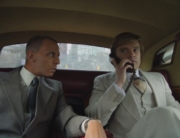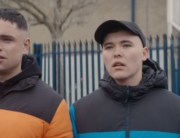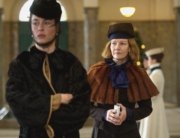
Robert Sheehan and Ben Barnes in KILLING BONO (Photo: Arc Entertainment)
Directed by Nick Hamm
Produced by Ian Flooks, Hamm, Mark Huffam & Piers Tempest
Written by Dick Clement, Ian la Frenais & Simon Maxwell, based on the memoirs I Was Bono’s Doppelganger by Neil McCormick
Released by Arc Entertainment
UK/Ireland. 114 min. Rated R
With Ben Barnes, Robert Sheehan, Krysten Ritter, Martin McCann & Pete Postlethwaite
Killing Bono is a surprisingly broad but otherwise enjoyable Behind the Music-type of comedy about frustrated musicians making frustrating choices as seen through the coke-smeared lenses of the 1980s Dublin and London underground music scenes. Despite its title, it should appeal mainly to U2 fans for its reverently humorous take on the band’s teenage years and to others who yearn for the days of demo tapes, stirring power pop ballads, and what must have been a global gender identity crisis working itself out through men’s fashion.
If rock critic Neil McCormick’s Telegraph article is anything to go by, the movie, based on his memoirs, is a largely made up (and sexed up) account of his early struggles to be a pop star living in the shadow of his much more successful classmate and childhood friend Paul Hewson, otherwise known as Bono. In the film’s version of events, Neil (Ben Barnes) sabotages his career and that of his loyal brother, Ivan (Robert Sheehan), whom he prevents from joining Bono’s high school band (then called the Hype) as a guitarist in the late 1970s. Guilt-ridden for basically robbing his younger brother of worldwide fame, and madly envious of his school chum, Neil makes a run of terrible decisions, which eventually spoil his own band’s chances and leave him a lonely, drunken mess who comes close to making the title come true. (Spoiler alert: Bono lives.)
This is in fact the sort of movie that will break the audience’s patience, causing audience, so appalled by the stupidity they see on screen, to talk out loud to the character. Repeatedly, Neil does the indie music equivalent of that bit in a horror film when someone goes upstairs alone to check out a mysterious noise. He spurns an offer to sell a song to Rod Stewart out of misguided notions of artistic purity, gets a loan from an Irish mob boss, is driven out of his band after sleeping with his producer’s wife, and finally turns down an offer from U2 to open for them at a Dublin concert (“I’d rather play for 500 of my fans than 50,000 of yours,” he tells Bono). The last remark drew audible, angry reactions at the screening I attended.
If this seemingly very low-budget feature has a main failing, it is that it’s actually rather corny. As directed by Nick Hamm and written by Dick Clement, Ian la Frenais and Simon Maxwell, it has an unmistakable sitcom vibe, and the humor is often broad to the point of cartoonish. By my count, there are at least two scenes where Neil is thrown out of a club and into a pile of trash (surely this gag can be retired forever from the movies at this point?). Also, Barnes is a handsome, likable presence, but his performance veers from controlled weirdness to sort of vaudeville panic—such as when the murderous mob boss threatens to do something ominous to Neil in his bathtub. (It should be noted that Clement and la Frenais wrote The Commitments, another Irish musical saga. But this isn’t in the same league.)
More successfully, Killing Bono drums up nostalgia for the early 1980s music scene. The brothers McCormick have lives in the movie that are meant to be wretched but are actually sort of appealing. For example, their supposedly filthy London apartment, owned by an aging and refined gay bon vivant (the late Pete Postlethwaite, in his final role), is a huge sprawling space that probably only a hedge fund manager could afford now. Plus, the clothes are amazing (cravats!).
Perhaps Killing Bono’s biggest feat is it makes Bono seem like a really great guy (helped by Martin McCann’s spot-on performance). Although he doesn’t get much screen time, he comes across as unbelievably generous and understanding, never forgetting the little guy and still able to poke fun at himself after making it big. Again, never mind the title—Bono is the only one here who emerges unscathed.
(Music note: one rerecorded tune by the Hype is heard. Most of the rest—such as the McCormicks’ songs—apparently were written for the production by Irish songwriter Joe Echo and performed by the cast.)






Leave A Comment